
A think tank, or policy institute, is a research institute that performs research and advocacy concerning topics such as social policy, political strategy, economics, military, technology, and culture. Most think tanks are non-governmental organizations, but some are semi-autonomous agencies within government or are associated with particular political parties, businesses or the military. Think-tank funding often includes a combination of donations from very wealthy people and those not so wealthy, with many also accepting government grants.
ITS, its or it's may refer to:
The Washington Institute for Near East Policy is a pro-Israel American think tank based in Washington, D.C., focused on the foreign policy of the United States in the Near East.

The Manohar Parrikar Institute for Defence Studies and Analyses (MP-IDSA), New Delhi, is India's foremost think tank for advanced research in international relations, especially defence, strategic and security issues, and providing training to civilian, military and paramilitary officers of the Indian government. It is funded by the Indian Ministry of Defence but operates as a non-partisan and autonomous body. It aims to promote national and international security by carrying out research on defence and security-related issues and disseminating the knowledge among the policy-makers and wider public.
The Foreign Policy Initiative (FPI) was an American think tank that operated from 2009 to 2017.
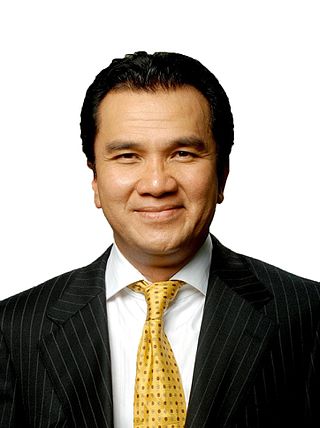
Tantowi Yahya is an Indonesian artist, presenter and politician who is a former Ambassador of Indonesia to New Zealand, Samoa and Tonga. He is most famous for hosting the Indonesian version of Who Wants to Be a Millionaire?. In 2009, Tantowi became member of Indonesian parliament from Golkar Party, representing South Sumatra province. In 2014, he was reelected and this time he represented the capital city, Jakarta.
The Foreign Policy Institute is a Turkish think tank on foreign policy and international relations. It was founded in 1974. The Foreign Policy Institute is the first ever Think Tank formed in Turkey. The founder and the first president is Seyfi Taşhan. The incumbent president is Hüseyin Bağcı.

James G. McGann (1955–2021) was an American academic who was a Senior Lecturer in International Studies, Founder and Director of the Think Tanks and Civil Societies Program at the Lauder Institute, University of Pennsylvania and a Senior Fellow at the Foreign Policy Research Institute. He was the author of numerous publications, including the renowned annual Global Go To Think Tank Index which ranks think tanks in all regions of the world. His most recent book was "Think Tanks: The New Knowledge and Policy Brokers in Asia" published by the Brookings Institution Press. Dr. McGann was most notable for his extensive work on public policy research organizations, and he was a frequent adviser to numerous governments and international organizations worldwide.
Islamic extremism in the United States comprises all forms of Islamic extremism occurring within the United States. Islamic extremism is an adherence to fundamentalist interpretations of Islam, potentially including the promotion of violence to achieve political goals. In the aftermath of the September 11, 2001 terror attacks, Islamic extremism became a prioritized national security concern of the U.S. government and a focus of many subsidiary security and law enforcement entities. Initially, the focus of concern was on foreign Islamic terrorist organizations, particularly al-Qaeda, but in the course of the years since the September 11 terror attacks, the focus has shifted more towards Islamic extremist and jihadist networks within the United States.

The Foundation for Defense of Democracies (FDD) is a 501(c)(3) non-profit think tank and registered lobbying organization based in Washington, D.C., United States.
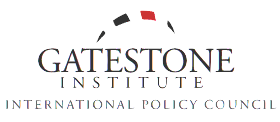
Gatestone Institute is a far-right think tank known for publishing anti-Muslim articles. It was founded in 2008 by Nina Rosenwald, who serves as its president. Former U.S. Ambassador to the United Nations and former national security advisor, John R. Bolton, was its chairman from 2013 to March 2018. Its current chairman is Amir Taheri. The organization has attracted attention for publishing false or inaccurate articles, some of which were shared widely.

Muhammad Rizieq bin Hussein Shihab is an Indonesian Islamist cleric, the founder and leader of the Islamist group Islamic Defenders Front, which was banned by the government in December 2020. Facing criminal charges in Indonesia, he lived in Riyadh, Saudi Arabia from 2017 to November 2020. Following his return to Indonesia, he was arrested in late 2020, accused of criminal incitement for holding crowded events that violated the COVID-19 pandemic regulations.
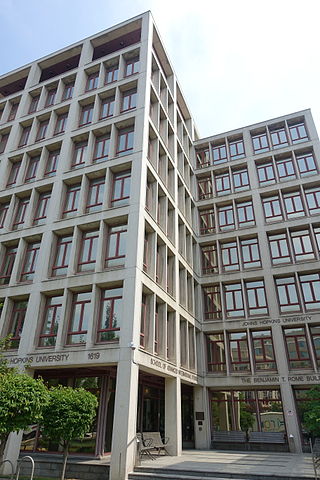
The Foreign Policy Institute (FPI) is an American research center based at The Johns Hopkins University's Paul H. Nitze School of Advanced International Studies (SAIS) in Washington, D.C., United States. The Institute, referred to as FPI, is housed in the Benjamin T. Rome building on the Embassy Row in Washington, D.C. FPI organizes research initiatives and study groups, and hosts leaders from around the world as resident or non-resident fellows in fields including international policy, business, journalism, and academia.
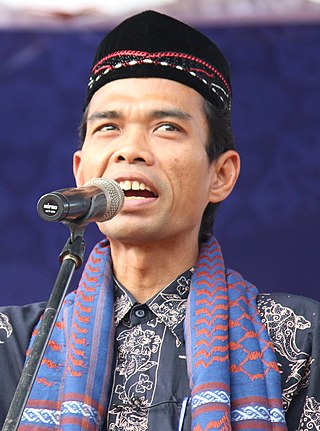
Abdul Somad Batubara is an Indonesian Islamic preacher, scholar and motivator from Asahan, North Sumatra. He is currently also serving as a lecturer at the Sultan Syarif Kasim II State Islamic University in Riau.

The Islamic Defenders Front was an Indonesian hardline Islamist organization founded in 1998 by Muhammad Rizieq Shihab with backing from military and political figures. Since 2015, Ahmad Shabri Lubis has been the organization's leader, while Rizieq Shihab holds the title of Grand Imam of the FPI for life. The FPI originally positioned itself as an Islamic religious police, mostly by conducting illegal and unauthorized vigilante operations. It also acted as an Islamist pressure group with prominent social media activism and mass mobilizations against pro-government activists, ethnic Chinese, Christian minority, as well as liberal and reformist politicians.
Jamaah Ansharut Daulah is an Indonesian group that has been reported to be linked to the 2018 Surabaya bombings as well as the 2019 Jolo Cathedral bombings. The Islamic State of Iraq and the Levant (ISIL) has been reported as claiming responsibility for both attacks. The group had been identified by the United States Department of State as a terrorist organization in 2017. It is banned by Iraq and Indonesia. It is also listed as a terrorist organization by the United Nations Security Council on 4 March 2020.
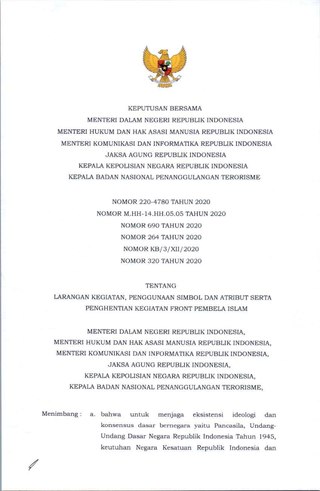
The Decree on Islamic Defenders Front or Joint Decree 220-4780/2020, M.HH-14.HH.05.05/2020, 690/2020, 264/2020, KB/3/XII/2020, 320/2020 is a decree enacted by six ministries and departments in Indonesia to prohibit any activity related to the Islamic Defenders Front (FPI) and the use of its related symbols. The decree was enacted on 30 December 2020, and is currently in force. The decree was read by Deputy Minister of Human Rights and Law, Eddy Hiariej. The Indonesian government argues that the Islamic Defenders Front and its members violated the law and accuse its members of links to terrorists, justifying the ban. The decree prohibits any association with Islamic Defender Fronts and justifies the arrest of anyone involved in its activities or carrying any symbols related to it. The ministers of the Ministries of Home Affairs, Law and Human Rights, Communication and Information Technology, the Attorney General, the Chief of the National Police, and the National Counter Terrorism Agency signed the law.










